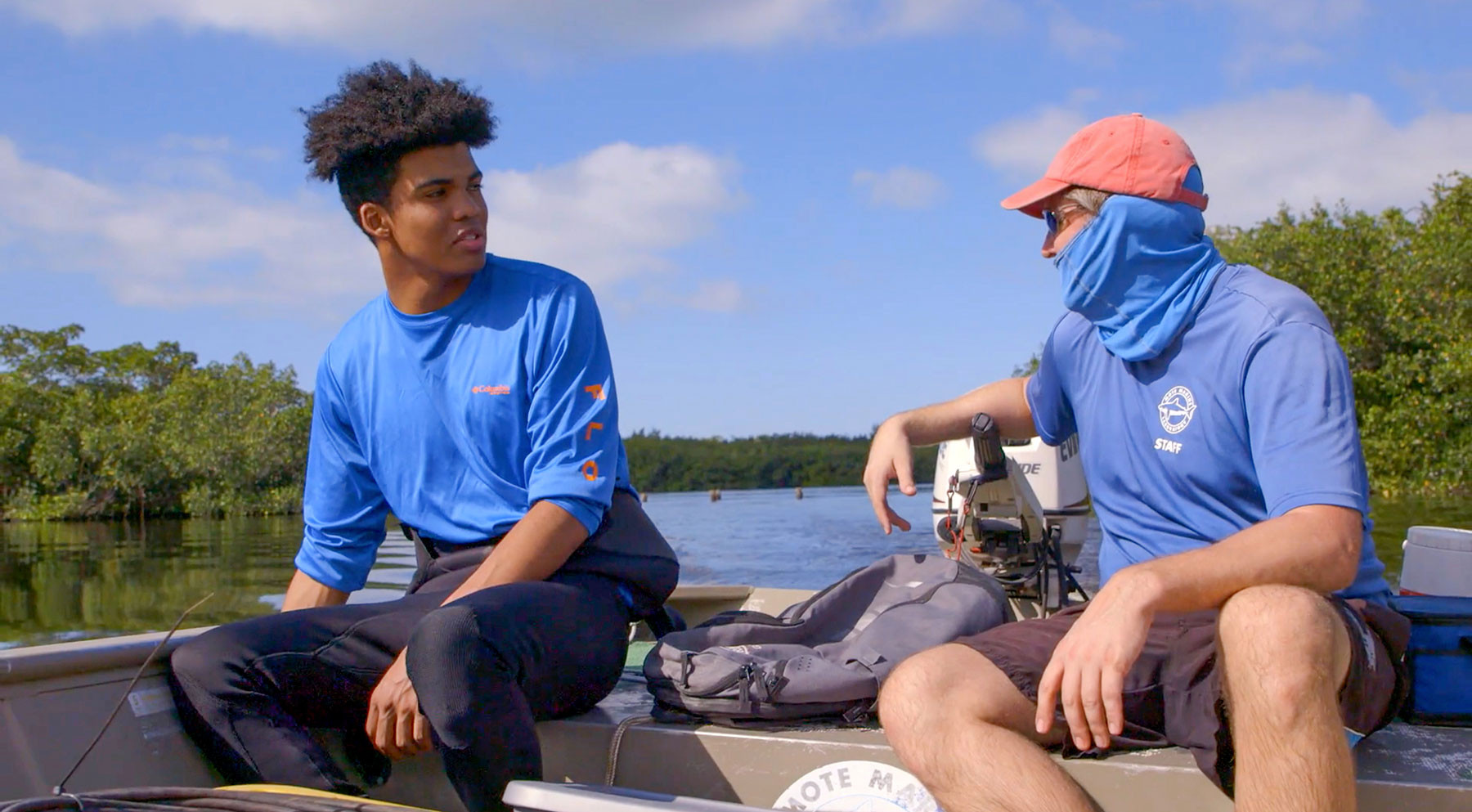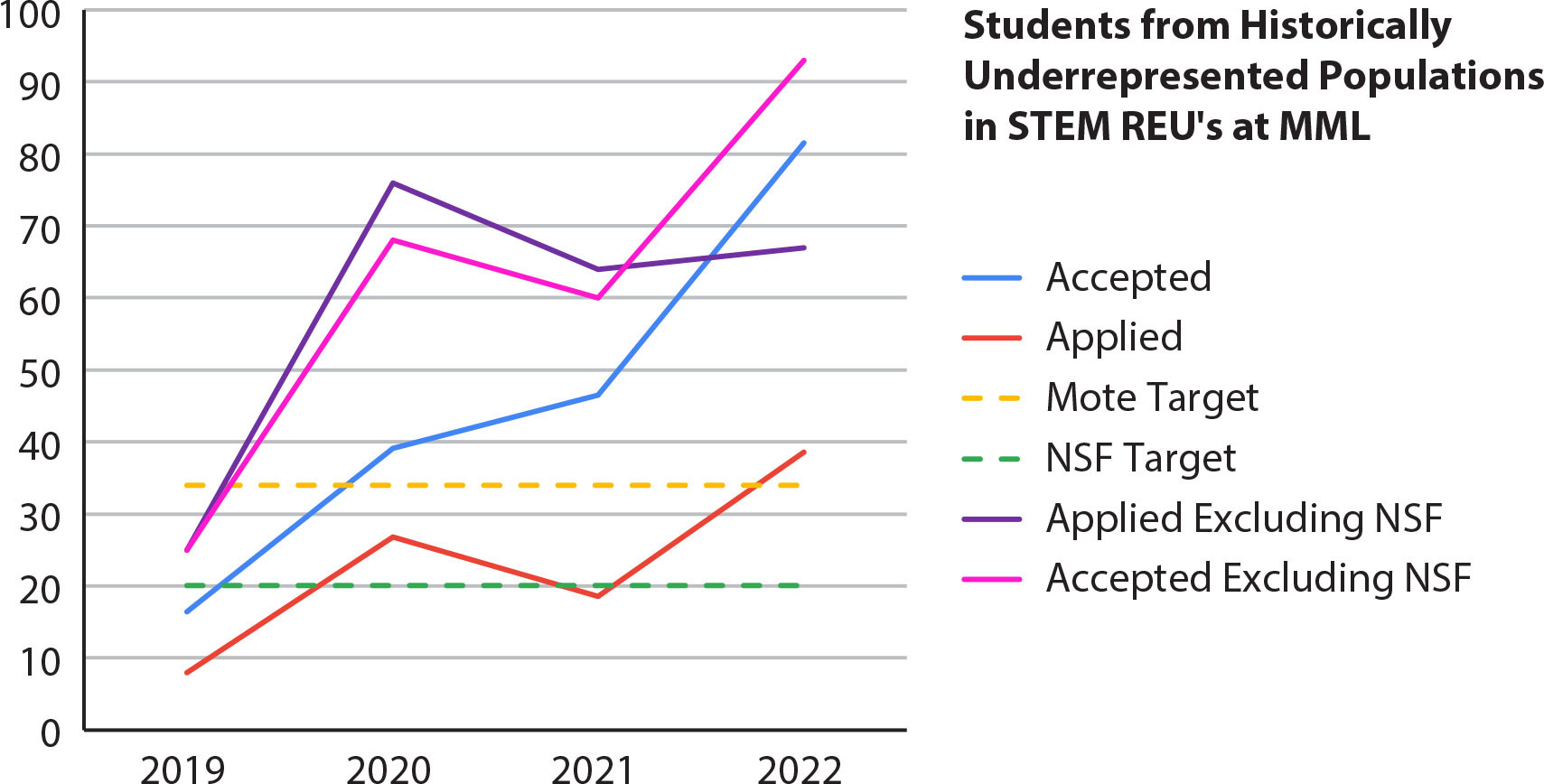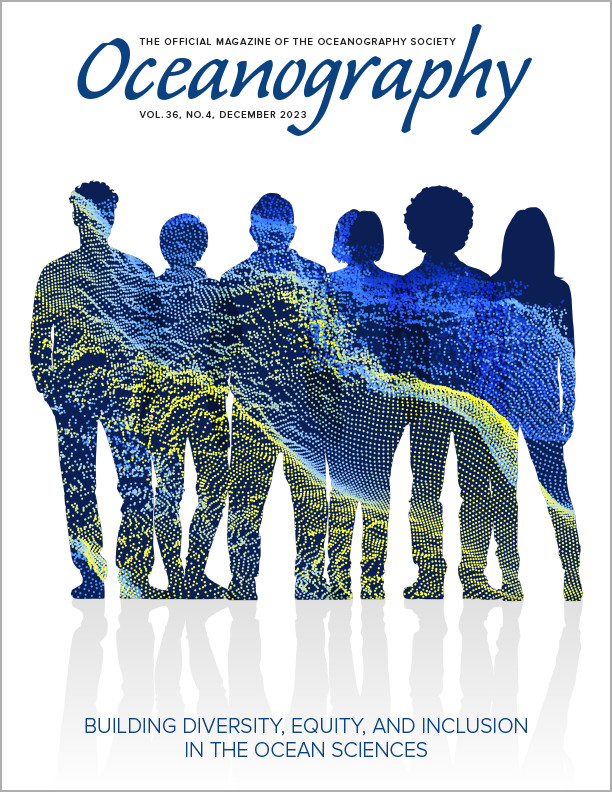Introduction
Undergraduate research experiences (URE1) are one high-impact (Kuh, 2012) pathway into the geosciences that could be better utilized to help address the lack of diversity within the field. Despite ample research demonstrating the value of UREs for STEM students, especially those from historically marginalized populations, there has been little study of what factors lead to an impactful URE and even less, if any, on what factors comprise an impactful and inclusive URE in marine STEM. Because of the importance of UREs in the overall success of STEM students, this is a significant gap in understanding that the National Science Foundation (NSF) Louis Stokes Alliance for Minority Participation: Marine Science Laboratory Alliance Center of Excellence (LSAMP/MarSci-LACE) seeks to fill.
The goal of MarSci-LACE is to improve understanding of the barriers to participation, develop successful support mechanisms, and create more inclusive UREs. These efforts are designed to increase the number of individuals from underrepresented populations in STEM fields, especially in marine STEM and related natural resources fields with high demands for a skilled workforce. Significant evidence indicates that participation in UREs results in students, particularly those from underrepresented populations, being more likely to persist in science majors during their undergraduate academic careers (Foertsch et al., 1997; Nagda et al., 1998; Bauer and Bennett, 2003; Summers and Hrabowski, 2006). Additionally, participation in UREs results in higher graduation rates for Black/African American science students than is common for colleges and universities overall (Nagda et al., 1998; Summers and Hrabowski, 2006; Kinzie et al., 2022). Participation in UREs increases retention in science fields beyond the undergraduate years as well as the likelihood that students will attend graduate school (Bauer and Bennett, 2003). Foertsch et al. (1997) found that graduate school attendance for Black/African-American students increased significantly from 8% for those who didn’t participate in a URE to 75% for those who did.
Through UREs, students develop a better understanding of the nature of science (Hunter et al., 2007) and gain technical proficiencies that include experimental design and data collection and analysis as well as skills critical to communication, teamwork and collaboration, independent work, and adapting to challenges (Hunter et al., 2007; Russell et al., 2007; Seymour et al., 2004). Positive outcomes for URE students include increased scientific knowledge (Nadelson et al., 2015), retention in STEM majors (Nagda et al., 1998; Hernandez et al., 2018), desire to attend graduate school (Russell et al., 2007; Eagan et al., 2013), and confidence in being more prepared to attend graduate school (Hunter et al., 2007; Seymour et al., 2004). Students also have a better understanding of science graduate school and careers (Russell et al., 2007) and are more inclined to pursue science careers and advanced degrees (Seymour et al., 2004; Hunter et al., 2007; Russell et al., 2007).
Hernandez et al. (2018) report that simply participating in a URE was not enough to influence students from underrepresented populations to persist in science. Mentoring has long served an essential role in developing STEM professionals. However, it has been found that individuals from underrepresented populations typically receive less mentoring than their nonminority peers (Athey et al., 2000; Smith et al., 2000; Ensher et al., 2001; Thomas et al., 2007; Beech et al., 2013; Milkman et al., 2015).
Program Description
MarSci-LACE was established in 2019 with Mote Marine Laboratory (MML) as the lead institution working in partnership with two academic institutions, College of the Florida Keys and State College of Florida, and two other independent marine research institutes, Perry Institute of Marine Science and the Smithsonian Marine Station. NSF funding was provided for an initial three-year grant period. MML is an independent, nonprofit marine research and science education institution with a staff of ~300, including >40 PhD-level scientists, whose members have conducted research around the world for nearly 70 years. MarSci-LACE is one of nine Louis Stokes Regional Centers of Excellence for Broadening Participation (LSRCEs). LSRCEs are not intended to directly support students during their academic paths but instead to conduct broadening participation research in order to disseminate successful practices.
Beginning in the summer of 2020 and through 2023, 6–10 students from the State College of Florida and College of the Florida Keys joined the approximately 200 other undergraduate interns at MML each year, including 10 NSF Research Experience for Undergraduates (REU) and 22 REU interns funded through MML STEM education philanthropy programs. MarSci-LACE interns received a stipend ($4,500 for full-time; $1,800 for part-time). While NSF and philanthropically funded URE interns receive housing and a stipend, as MarSci-LACE interns are local, they did not receive housing. MarSci-LACE interns could participate in UREs during the summer and/or academic year. While traditional REUs and many other UREs are full-time internship experiences, generally for a period of 8–14 weeks during summer, MarSci-LACE found that this structure would be restrictive for many students, especially those from the project’s target populations. Therefore, both full-time (a minimum of 300 hours, either over a 10-week period during the summer or a longer duration during the school year) and part-time (a minimum of 120 hours) internship experiences were offered to make the UREs at MML as accessible as possible. MarSci-LACE interns work either independently or collaboratively with other interns on a research project under the mentorship of professional scientists across a wide range of marine-related science, technology, and engineering fields (Figure 1).

FIGURE 1. Marine Science Laboratory Alliance Center of Excellence (MarSci-LACE) intern Justin Gamboa, left, heads out to conduct fieldwork with Mote Marine Laboratory mentor and Program Manager for Fisheries Ecology & Enhancement Ryan Schloesser. > High res figure
|
Recognizing that not all interns come to a URE with the same background knowledge, science experiences, or content knowledge, the portfolio of supports and resources described below has been developed.
Intern Resources
The Intern Alliance is a series of weekly sessions designed and available to all interns at MML as part of MarSci-LACE. These hour-long sessions cover topics relevant for interns, including science technical skills refinement, science communication, and professional development. Office hours for interns have also been included as a way to provide interns extra assistance with specific research-related needs. An Intern Resource Guide provides a handbook of resources aimed to serve as additional support during the internship, including specific science skills practice, communication of research, and post internship materials. The guide is designed to complement the Mentor Resource Guide in an effort to help facilitate effective communication between mentors and interns, align expectations, and make both the intern and mentor aware of resources available. As resources continued to be created, refreshed, and evolve, the need to house them in a centralized location motivated the creation of the online Intern Resource Site. This site serves as a comprehensive repository for interns, mentors, and alumni. These resources encompass not only internship and mentorship materials but also community and mental health support, along with information and guides pertaining to higher education opportunities and beyond.
Mentor Development Workshops
In addition to intern support resources, resources have also been created for MarSci-LACE mentors. A Mentor Development Workshop has been iteratively developed over the course of this project, along with a Mentor Refresher Course as an annual renewal of mentorship training. Given the overwhelming evidence of the impact of strong mentorship, there is an increasing demand for demonstrated high-quality, innovative mentor trainings and materials that are easily implemented and appropriate for mentors of every level. This is especially critical in fields like marine sciences where the vast majority of mentors are from populations that are not underrepresented.
The six-hour Mentor Development Workshop interactively engages URE mentors through the following training modules: Introduction to Mentoring, Psychosocial Factors of Internships, Ally Skills, and Mentor Plan Development. A Culturally Responsive Mentoring Module is currently being developed and will be integrated into the trainings. The Mentor Development Refresher Workshop is a two-hour discussion-based course that revisits some of the critical topics discussed in the full mentor training, while also creating the opportunity for mentors to revisit their mentorship plans and reflect upon their mentorship experiences. These trainings continue to develop and evolve as feedback is collected from mentors and MML interns regarding mentorship.
To date, 97% of the over 120 mentors who attended the Mentor Development Workshop and Mentor Development Refresher Workshop at MML reported that attending the Mentor Development Workshop was a valuable use of their time. As a result of interest from MML mentors, the Mentor Alliance was formed for mentors who would like to continue their professional development with like-minded peers. Periodic meetings of the Mentor Alliance are participant driven in various areas of training and professional development, both in person and via web conferencing.
Mentor Resource Guide
The Mentor Resource Guide includes resources beyond those covered in the Mentor Development Workshop, as well as resources that align with items in the Intern Resource Guide. These include an intern selection rubric, a mentor-intern agreement template, mentor-intern check-in guides, and other important information and resources for mentors.
Program Results
Since the program began in 2019, MML has hosted 33 MarSci-LACE interns from State College of Florida and College of the Florida Keys and an additional 732 other undergraduate interns including NSF and philanthropically funded REU students. In addition, MML has conducted research concerning affectual changes in students over the courses of their internships. While much of the interview and survey data are still being analyzed, initial findings demonstrate an appreciable increase in sense of belonging noted in survey data and supported by interview data from MarSci-LACE interns. As of the end of 2022, the majority of these interns stated that the Intern Alliance events are a good use of their time, and over 95% of those responding to the post-survey reported that they felt supported during their research experience and would describe their experience as transformative.
Efforts to develop new and refine existing efforts in REU recruitment and application processes have resulted in an increase in diversity among MML internship applicants and those accepted (Figure 2). The percentage of students from historically underrepresented populations who participated in all MML REUs increased from 17% in 2019 prior to the start of MarSci-LACE to 82% in 2022, with the overall number these applicants increasing from 8% to 39%. If NSF REUs are excluded, the percentage of applicants from underrepresented populations increased to 67% for 2022.

FIGURE 2. The graph shows the percentage of students from historically underrepresented populations who applied to, as well as those who were accepted to, Mote Marine Laboratory (MML) Research Experiences for Undergraduate (REU) internships by years since the start of MarSci-LACE in 2019, including National Science Foundation REUs, MarSci-LACE REUs, and philanthropically funded REUs. > High res figure
|
Lessons Learned
A number of lessons were learned through this project. In terms of recruitment from this population of students, we found that there can be a lack of understanding as to what an internship is and the possible benefits of participation. Additionally, there were assumptions as to the skills needed to participate in marine science internships (e.g., swimming), and for students without much background in marine science, choosing a specific research program could be overwhelming. Adjustments were made based on these observations. Additionally, it was found that having a professor, academic advisor, or peer recommend the internship program improved recruitment, as did individual follow-up from MarSci-LACE staff for students who initiated applications or for students whom we knew were interested.
Flexibility in the structure of the internship is key. Many students were simply not able to put everything on hold for 8–12 weeks to participate in a full-time internship. Part-time options were critical for students who had employment, family, or other ongoing obligations.
The availability of support mechanisms during the internship is also critical. The Intern Alliance helped cultivate skill development and social support and provided on-demand “office hours” where interns could get one-on-one help from staff with specific areas of needed extra attention. The creation of the complementary Intern and Mentor Resource Guides helped mentors and interns align expectations, facilitated communication between them, and provided helpful resources to each. Provision of training for all mentors through the Mentor Development Workshop is especially critical in fields like marine sciences where the vast majority of mentors are not from underrepresented populations. MarSci-LACE staff also held both informal and formal check-ins with interns throughout their internships to help address any issues or areas of concern and generally to provide additional support.
Finally, there has been significant interest in and demand for the Mentor Development Workshop from non-MarSci-LACE groups. Program staff has secured supplemental NSF support in order to offer the Mentor Development Workshop to outside groups, and a train-the-trainer workshop is currently in development.
Acknowledgments
This material is based upon work supported by the National Science Foundation under Grant #1922351. Any opinions, findings, and conclusions or recommendations expressed in this material are those of the authors and do not necessarily reflect the views of the National Science Foundation.



